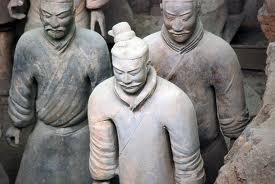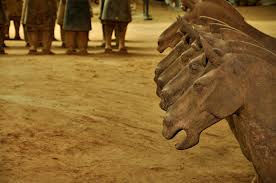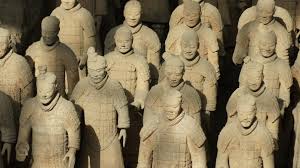Sun Tzu’s Art Of War is believed to have been written in the sixth century or 512 BCE (Before Common Era). The text is considered to be one of the Seven Military Classics in China. The work is considered poetic, in its great wisdom. Now the famed classic may be used to determine leadership qualities, as well as, strategies in business.
1. Never Lead By Force
- “The Commander stands for the virtues of wisdom, sincerity, benevolence, courage, and strictness.”
- “The consummate leader cultivates the moral law, and strictly adheres to method and discipline; thus it is in his power to control success.”
- “Hence in the wise leader’s plans, considerations of advantage and of disadvantage will be blended together.”
2. Know The Competition
- “Hold out baits to entice the enemy. Feign disorder and crush him.’
- “If your opponent is of choleric temper, seek to irritate him. Pretend to be weak, that he may grow arrogant.”
- “So in war, the way is to avoid what is strong and to strike at what is weak.“
3. Doing Nothing Is Better Than Acting Out Of Fear
- “If it is to your advantage, make a forward move; if not, stay where you are.”
- Hence the saying: If you know the enemy and know yourself, you need not fear the result of a
hundred battles. If you know yourself but not the enemy, for every victory gained you will also suffer
a defeat. If you know neither the enemy nor yourself, you will succumb in every battle.”
- “The quality of decision is like the well-timed swoop of a falcon which enables it to strike and
destroy its victim.”
4. Always Plan Ahead
- “Hence the saying: The enlightened ruler lays his plans well ahead; the good general cultivates his resources.”
- “By altering his arrangements and changing his plans, he keeps the enemy without definite
knowledge. By shifting his camp and taking circuitous routes, he prevents the enemy from anticipating
his purpose.”
- “According as circumstances are favorable, one should modify one’s plans.”
5. Refrain From Decision-Making When Angry
- “No ruler should put troops into the field merely to gratify his own spleen; no general should fight a battle simply out of pique.”
- “Hence to fight and conquer in all your battles is not supreme excellence; supreme excellence
consists in breaking the enemy’s resistance without fighting.”
- “Therefore the skillful leader subdues the enemy’s troops without any fighting; he captures their
cities without laying siege to them; he overthrows their kingdom without lengthy operations in the
field.”
6. Study The Competition
- “He who knows things, and in fighting puts his knowledge into practice, will win his battles. He who knows them not, nor practices them, will surely be defeated.”
- “Carefully compare the opposing army with your own, so that you may know where strength is superabundant and where it is deficient.”
- “What enables the wise sovereign and the good general to strike and conquer, and achieve things beyond the reach of ordinary men, is foreknowledge.”
7. Use Your Team Wisely
- “The clever combatant looks to the effect of combined energy, and does not require too much from individuals. Hence his ability to pick out the right men and utilize combined energy.”
- “When he utilizes combined energy, his fighting men become as it were like unto rolling logs or stones. For it is the nature of a log or stone to remain motionless on level ground, and to move when on a slope; if four-cornered, to come to a standstill, but if round-shaped to go rolling down.”
- “If there is disturbance in the camp, the general’s authority is weak. If the banners and flags are shifted about, sedition is afoot. If the officers are angry, it means that the men are weary.”
8. Act Like A Leader
- “It is the business of a general to be quiet and thus ensure secrecy; upright and just, and thus maintain order.”
- “He must be able to mystify his officers and men by false reports and appearances, and thus keep them in total ignorance.”
- “Bestow rewards without regard to rule, issue orders without regard to previous arrangements; and you will be able to handle a whole army as though you had to do with but a single man.”
9. Trust Yourself
- “He will win who knows when to fight and when not to fight.”
- “He will win who, prepared himself, waits to take the enemy unprepared.”
- “He will win who knows how to handle both superior and inferior forces.”
10. Think Strategically
- “With his forces intact he will dispute the mastery of the Empire, and thus, without losing a man, his
triumph will be complete. This is the method of attacking by stratagem.”
- “It is the rule in war, if our forces are ten to the enemy’s one, to surround him; if five to one, to attack
him; if twice as numerous, to divide our army into two.”
- “He will win who knows when to fight and when not to fight.”
11. Know Yourself
- If you know the enemy and know yourself, you need not fear the result of a hundred battles. If you know yourself but not the enemy, for every victory gained you will also suffer a defeat. If you know neither the enemy nor yourself, you will succumb in every battle.
- “He will win who, prepared himself, waits to take the enemy unprepared.”
- “Be extremely subtle, even to the point of formlessness. Be extremely mysterious, even to the point of soundlessness. Thereby you can be the director of the opponent’s fate.”
12. Think Diplomatically
- “All warfare is based on deception.”
- “If your opponent is of choleric temper, seek to irritate him. Pretend to be weak, that he may grow
arrogant.”
- “Thus, though we have heard of stupid haste in war, cleverness has never been seen associated
with long delays.”
13. Never Lose Sight Of The Goal
- “In war, then, let your great object be victory, not lengthy campaigns.”
- “He will win whose army is animated by the same spirit throughout all its ranks.”
- “To see victory only when it is within the ken of the common herd is not the acme of excellence.”
14. Have A Plan
- “Strategy without tactics is the slowest route to victory. Tactics without strategy is the noise before defeat.”
- “Let your plans be dark and impenetrable as night, and when you move, fall like a thunderbolt.”
- “When strong, avoid them. If of high morale, depress them. Seem humble to fill them with conceit. If at ease, exhaust them. If united, separate them. Attack their weaknesses. Emerge to their surprise.”
15. Know When To Quit
- “When you surround an army, leave an outlet free. Do not press a desperate foe too hard.”
- “The greatest victory is that which requires no battle.”
- “Build your opponent a golden bridge to retreat across.”

















































